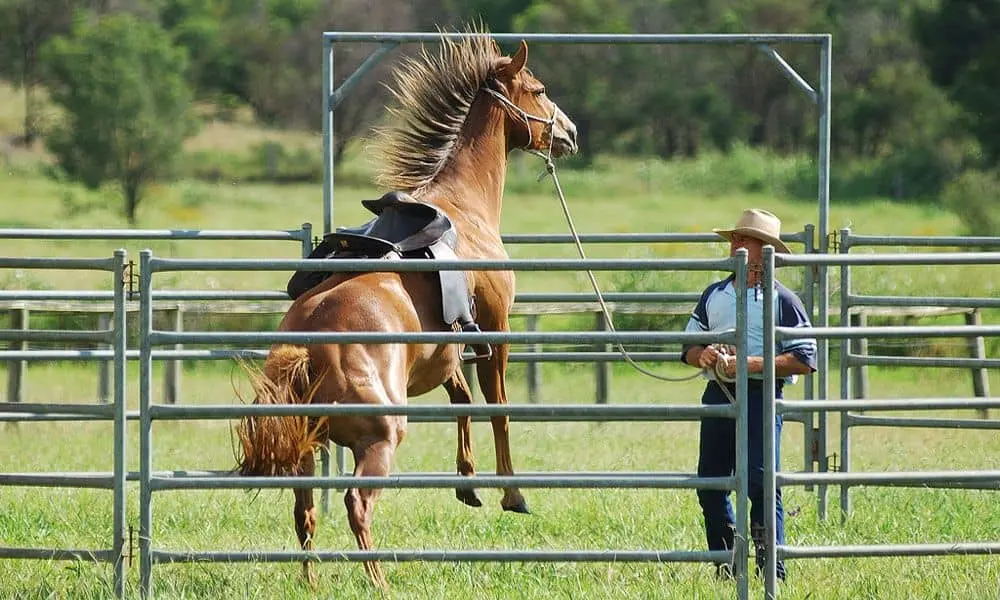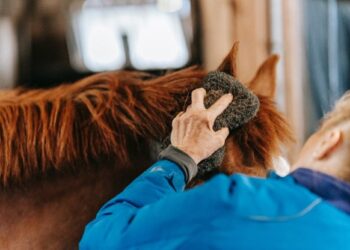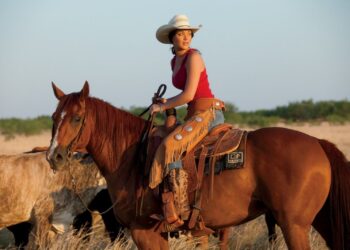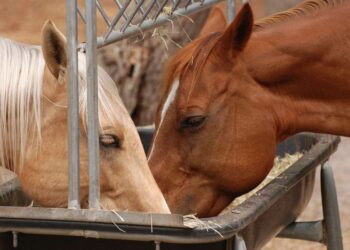Unfortunately, many horse owners fail to see how important communication is to their animals. The tamest horse can suddenly become aggressive behavioral problems in horses. The anger can be directed at another horse, but the owner can also be the one who takes the blows. How do these problems arise and how do you deal with them?
General
Because a horse is a herd animal, he or she must be able to communicate with its peers at any time. Only then will the horse feel good. For example, he lets others know if there is danger or if he feels like playing. But through body language, a horse also lets you know what position it has within the herd.
Since horses cannot communicate, they use their body language. In this way, they share their feelings and emotions with their herd mates. Everything is stored in the brain. Negative experiences appear to be remembered more often by the horse than positive experiences.
That is why it is so difficult to unlearn bad behavior. The horse language is often without sound. A slight movement of the head, tensing a muscle, or changing the position of the ears is enough for a horse to show its feelings and mood.
A horse is quickly labeled as aggressive or false even though many warnings have already preceded it. Many such natural horse reactions are interpreted by people as vices or as a behavioral problem of the horse, but often negative experiences or traumas are associated with them.
Reading suggestions; 500 Horse Names For Male and Female Horse Names
Many of these natural horse reactions are interpreted by people as vices or as a behavioral problem of the horse, but often they are associated with negative experiences or trauma.
Cause
Behavioral problems in horses do not just appear out of the blue. Horses that exhibit problem behavior always have a reason for it. It is up to humans to discover which signals the horse gives and why the horse behaves in that particular way.
For example, the horse often has bad experiences in the past, but there are also horses that have simply never learned ‘how it should be’ properly. So there is no typical cause for a behavioral problem. Usually, you have to experience this yourself, especially think of these points
Dominance
Dominant behavior is quite different from a dominant character. Some horses are dominant in character. Others become dominant due to stress or some other reason. A simple mistake of miscommunication can lead to a problem.
Clearly let the horse know who’s boss and that you won’t accept the dominant behavior. Dominant horses will pull out all the stops to gain control, and the longer the problem persists, the sooner you’ll have a discussion or even battle over leadership.
Territorial horse’s behavioral problems
A horse that is locked up in a stable can consider that stable as his terrain. If you want to invade this area, the horse will sometimes clearly let you know that this is not the intention.
Try to let your horse know that he is safe even when his leader is in his territory. Horses naturally display territorial behavioral problems when there is too little food or drink. So make sure that this is always supplemented enough.
Reading Suggestions: 6 Best Horse Clippers For Body Clipping
Disease
Tumors can cause hormone imbalances or short circuits in the brain. In some cases, horses can even show aggressive behavior. Chronic pain and the associated behavioral changes usually start slowly and are therefore difficult to recognize. If you want to be sure, you can always decide to see a doctor.
Pain
Does your horse have a wound somewhere? First, take the time to ensure recovery or treatment. For example, CBD for horses (shop horse cbd here) is a popular form of treatment for a horse struggling with pain. No matter how small the wound is, the horse can definitely feel it. Horses do not exhibit typical pain behavior and do not express distress calls, instead, their behavior may play an important role in expressing pain.
Fear
Are you forcing your horse past something that scared him before? When startled, they defend themselves or want to flee. This is natural behavior and because a horse is a flight animal it will quickly flee from a scary object.
With patience, this can always be solved. Only if the horse fully trusts you, will he dare to pass if you ask him or her to do so. Especially a panic attack should be taken seriously, because of this a horse can be terrified.
Boredom
If a horse is locked up in a stable for most of the day, he is dependent on his or her owner. If he also walks by without looking back, kicking the stable is a logical reaction. Just because it’s a logical response doesn’t mean you have to accept this behavior. Standing alone in a small box all day or for example, too little exercise leads to loneliness and boredom. Doing activities with your horse creates a better bond and will prevent boredom.
Reading Suggestions: Mare In Heat: Duration, Frequency & Signs
Aggression Behavioral Problems in Horses
When horses get annoyed, they show different kinds of threatening behavior. Aggression can have various causes. It can be a tenacious bait, but also a competitive fight for food. In the less pronounced form, the horse is tense, then he puts on his ears and stretches his head forward.
If that is not enough, the horse will swing its tail back and forth and rear or strike. Try to find the source of this aggressive behavior and solve it. Ignore aggressive behavior as much as possible, in many cases, it is a trick to get attention. Reward your horse if he is not dominant.
Solution
The easiest solution to problem behavioral Problems in Horses is of course to sell the horse and thereby saddle someone else with the problem and then look for the next horse. You will soon notice that this is not the solution. The next horse may also have its quirks, and in addition, the horse sold is likely to have behavioral problems again.
By understanding the Behavioral Problems in Horses, problems can often be solved very quickly. You should use knowledge about the natural behavior of the horse. Don’t allow too many strangers in unless necessary. A horse focuses most on one person and it can be dangerous if you allow too many different people.
Clearly indicate where your limits are, that you are the boss and that you will not accept kicks or bites. While driving, you can occasionally use a corrective tap and especially use your body language and voice. The most important thing is to make sure that the rider is relaxed.
If that is the case, the horse will also relax faster. Groundwork can also help to calm a dominant horse. The most important aspects to solve problem behavior are respect, calmness, leadership, clarity, and the right timing for rewarding the horse. If nothing works, find someone who can help you correct your horse’s behavior. Groundwork can also help a dominant horse to calm down.
The most important aspects to solve problem behavior are respect, calmness, leadership, clarity, and the right timing for rewarding the horse. If nothing works, find someone who can help you correct your horse’s behavior. Groundwork can also help a dominant horse to calm down.
The most important aspects to solve problem behavior are respect, calmness, leadership, clarity, and the right timing for rewarding the horse. If nothing works, find someone who can help you correct your horse’s behavior.










